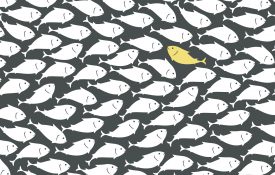-
Playing make-believe can deprive kids of important developmental experiences
Dallas News: Pretend play is a charming activity. Children pretend that their living room is a restaurant where they prepare and serve food, or they imagine the tree outside is a castle. American parents serve this activity by purchasing toys to support it ($20 billion worth last year), and most think pretending is very important to children's development. But the evidence on the latter point is actually quite weak. Pretend play is a wonderful display of the human imagination and our ability to make and use symbols, but its developmental benefit to children is a cultural assumption. ... When I got back to the States, my student Jess Taggart and my lab manager M.J.
-

Romantic Matches Are Hard to Predict Before People Meet
Researchers could predict speed daters’ desire and desirability, but not which two people would ‘click.’
-

Trying to Get Ahead? Plan in Reverse, Study Suggests
We’re most enthusiastic about projects when we start and finish them, but intervening hassles can turn determination soft.
-
The Secret to a Good Robot Teacher
The New York Times: Why is educational technology such a disappointment? In recent years, parents and schools have been exposing children to a range of computer-mediated instruction, and adults have been turning to “brain training” apps to sharpen their minds, but the results have not been encouraging. A six-year research project commissioned by the Department of Education examined different cybertechnology programs across thousands of students in hundreds of schools and found little to no evidence that they improved academic performance. Unfortunately, it appears the same goes for cognitive-training programs.
-
How Friends Become Closer
The Atlantic: “Friendships don’t just happen,” says William Rawlins, a professor of interpersonal communication at Ohio University. “They don’t drop from the sky.” Like any relationship, friendships take effort and work. But they’re often the last to receive that effort after people expend their energy on work, family, and romance. And as I’ve written before, as time goes on, friendships often face more hurdles to intimacy than other close relationships. As people hurtle toward the peak busyness of middle age, friends—who are usually a lower priority than partners, parents, and children—tend to fall by the wayside. ...
-
What Should We Be Teaching Young Children?
NPR: Early-childhood and elementary school programs reflect a diverse set of commitments about what children ought to learn, and about how they ought to do so. Some focus on academic preparation and advancement, with extra attention to reading and mathematics. Some emphasize social-emotional development and community values. Others tout their language classes, or their music program, or the opportunities for children to engage in extended projects of their choosing. Some praise structure and discipline; some prize autonomy and play. Alongside this profusion of options is a rich diet of advice: parenting books, articles, Facebook groups, and friends who swear by one approach or another.

